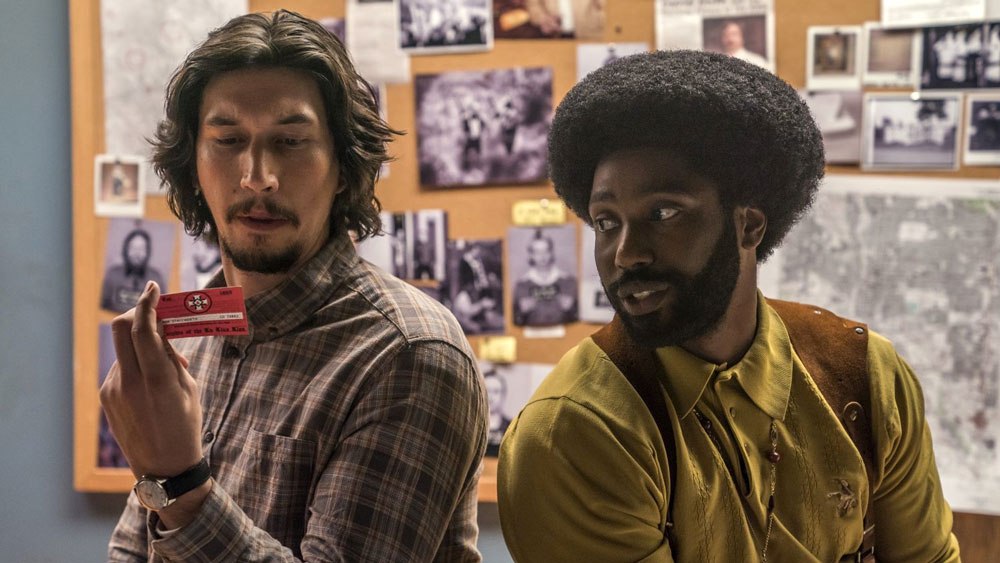
Spike Lee is quite clearly fired up as he scatters sharp, defiant dialogue all through BlacKKKlansman, his first feature film since 2015’s good-but-uneven Chi-Raq and without a doubt one of his best works to date. That is no overstatement either, with Lee directing a big middle finger to the racism both explicit and implicit, by care of lead John David Washington, who plays an African-American police officer conning his way into the inner-circle of the Colorado Springs chapter of the Klu Klux Klan.
Perhaps most striking about the film, which should go down as one of the most talked about of 2018, is the no-holds-barred dialogue employed by Lee and screenplay collaborators David Rabinowitz, Charlie Wachtel, and Kevin Willmott. By accentuating the blunt extremism of the views underpinning the KKK and their warped outlook in an almost comical, hard-to-swallow way, BlacKKKlansman successfully highlights just how hateful such a group is, and how that hatred fuels their unrelenting racist views. The pointed, punchy dialogue is threaded through a broad style that makes heated connections with the Trump presidency in ways that are not at all subtle, intentionally disconnecting from its 70s context at times to make wink-faced modern references, culminating in the use of video footage from last year’s bloody events in Charlottesville at the film’s end.
While Lee’s statement-heavy signatures are all over this one, there’s a heavy, accessible commercial appeal here as the film brings to life the true story of Ron Stallworth (Washington), said black Colorado police officer who masterfully tricks the local chapter of the KKK into accepting him by way of posing as a white bigot over the phone. The first black police officer on the force isn’t content with wasting his time on menial assignments, heading straight for the jugular as he impresses and infiltrates the racist collective, highlighting the (socially constructed) distinction between a “white” and a “black” voice. Of course, face-to-face meetings present a bit of a problem, which is where his partner (Adam Driver as Jewish officer Flip, steps in and the two attempt to synchronise their lives. There’s some huge entertainment value to be had, with their smart play contrasted with the hillbilly sketches of not only the low-hanging fruit that makes up the local KKK chapter, but also supposed mastermind – but really confident idiot – David Duke (Topher Grace with whom Stallworth develops a close on-the-phone relationship.
There are facets to the film which don’t work as well. The relationship between Stallworth and the president of the Black Student Union, Patrice (Laura Ruth Harrier) feels forced and obligatory, never contextualised enough to make the resulting events feel anything more than convenience to the blaxploitation tropes Lee uses so liberally. If anything, it provides a path to a former Black Panther to raise the stakes and help attack the far-right thinking which is obviously being skewered throughout the entire film. It even goes so far as to bring Harry Belafonte in for an extended monologue and rallying call used to great effect.
The less spoiled about the events of the film, the better. It’s genuinely funny with a strong sense of character even if not all are weighed equally. Perhaps speaking largely to Jordan Peele’s no doubt valuable involvement, there’s a great degree of balance between the comedic aspects and self-conscious drama, which is even self-reflexive times.
This isn’t the only film to use a “black man using a white voice” to speak volumes about the subtle racial divides, with Boots Riley’s Sorry to Bother You also relying heavily on the device. Pitting those two movies up against each other seems inevitable in any resulting media although it would be foolish to try and use ones message to somehow dull the others. They are both fantastic films with individual voices, and if a comparison must be made it’s that BlacKKKlansman is much more chiselled in it’s unrelenting takedown of both traditional and modern racist institutions and individuals, whereas Boots’ equally entertaining film is more like a nightmarish dreamscape that, while overindulging in its own weirdness, arrives at a similar point though without a focus for all that righteous fury.
![]()
![]()
![]()
![]()
![]()
FOUR STARS OUT OF FIVE
BlacKKKlansman was reviewed at Sydney Film Festival. It will receive a wide release in Australia on 16th August 2018.
